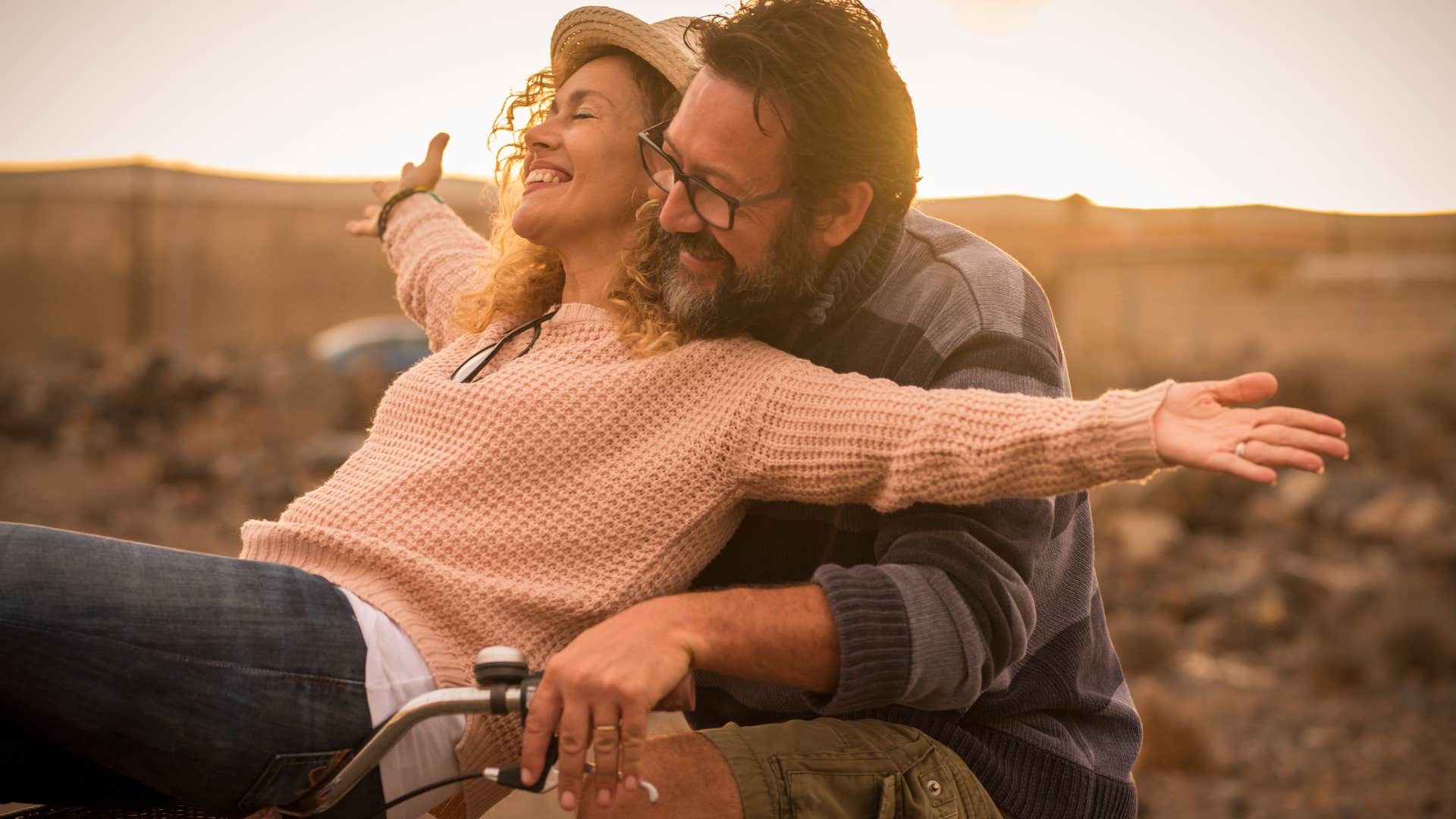You Had A Good Childhood If These 11 Things Still Feel Normal To You
No matter how old or young you are, if these things still feel normal for you, chances are your childhood was a golden one.
 Perfect Wave | Shutterstock
Perfect Wave | Shutterstock When we're young, we generally don't think about how the little things that we do on a daily basis will impact our lives when we're older. You may have sipped directly from the hose as a child, and now, as an adult, you can't imagine leaving the house without a water bottle on hand. These crude behaviors later evolved into refined routines thanks to our parents, who allowed us to experience them.
If you had a good childhood, many things you did as a kid still feel normal to you because they feel nostalgic and whimsical. They may serve as emotional comfort for us when we're feeling down or simply want to take a walk down memory lane. If you had a decent childhood, then the behaviors you were taught likely transferred over into your adult life.
You had a good childhood if these 11 things still feel normal to you
1. Knowing people's numbers by heart
 fizkes | Shutterstock
fizkes | Shutterstock
Those who grew up in today's age will never understand the struggle of having to learn the phone numbers of everyone you know. It's a childhood memory that seemed like no big deal to us back then, but now it's a skill we're proud of. Knowing someone's phone number by heart can help you in an emergency and demonstrate that certain parts of your brain are still in good shape.
A cognitive brain function like chunking can help break up large numbers into smaller groups to help you remember them better. This is because the brain is wired to look for structure and patterns. You had a great foundation in childhood if you were taught how to do this, because it was a mathematical teaching skill. The problem was not being able to communicate with your friends unless you had their numbers.
2. Taking part in outdoor activities
 simona pilolla 2 | Shutterstock
simona pilolla 2 | Shutterstock
Engaging in outdoor activities, such as riding a bike, was a natural part of childhood that many of us can relate to. Riding a bike is all about taking control of your direction, physically and in life. If you enjoyed outdoor activities as a child, then chances are you also enjoy the same things as an adult.
Outdoor recreational activities improve moods, reduce anxiety, and bring environmental awareness to people, particularly when they are young. It taught us how to cooperate when playing with a team and to pick ourselves back up if we fall. This connection to each other and nature created cherished moments that we remember fondly.
3. Staying up late to watch a show or a movie
 Lordn | Shutterstock
Lordn | Shutterstock
There's no better feeling than staying up late to watch your favorite movies or television shows that you enjoyed as a child. The nostalgia brings you back to a more comfortable place in time and allows you to temporarily step away from situations that are currently stressing you out. Now that you are no longer a kid, you don't have any pesky parents telling you that you can't watch a certain horror film or that you have to go to bed early for the night.
While you still have adult responsibilities in the morning, you are willing to make that sacrifice just to catch up on your favorite shows. Besides, night owls have been shown to be smarter than those who go to bed early. You might have grown up, but your mannerisms still want that late-night freedom that you got without your parents knowing.
4. Obsessing over things you take care of
 MT-R | Shutterstock
MT-R | Shutterstock
No matter what generation you were a part of growing up, you always had something to take care of, whether it was a pet, a plant, or even a Tamagotchi. Taking care of something other than yourself instilled responsibility in you. As time passed, your childhood pets or plants were no longer around. Which is probably the reason why you obsess over your newer pets now.
As an adult, you treat your pets more than just something to entertain you, but instead as a part of the family. Around 51% of owners see their pets as equal to humans, particularly as family members. Which means they get just as much attention, care, and emotional investment as everyone else in the home. It has gotten so extreme that even certain states treat pets better than humans.
5. Listening to old and new music
 l i g h t p o e t | Shutterstock
l i g h t p o e t | Shutterstock
Growing up in a home where both old-school tracks and current chart-toppers played in the background meant that music wasn't just background noise but a shared experience. Whether it's the lyrics that spoke to you or the music itself, you learned to appreciate both the old and the new. You had a great childhood filled with musical expression and open-mindedness as you learned about the true meanings behind the songs.
As an adult, you now find yourself going through all of your mix CDs that you burned off of LimeWire to not only jam but to figure out why you even liked this type of music to begin with. Cognitive psychology identifies what's known as the "reminiscence bump," a phenomenon where music from people's adolescence or early adulthood years evokes strong memories and emotions. Which means you're not just replaying the greatest hits of all time, but you're replaying the memories that came with them.
6. Posing for photos
 Prostock-studio | Shutterstock
Prostock-studio | Shutterstock
Striking a pose for family photos is something that many of us grew up doing without a second thought. As soon as a camera was present, we would naturally do this, and it felt fun. Little did we know that there were health benefits to be gained from this. Family routines, including shared activities such as posing for photos, can help reduce conflict and promote more prosocial behaviors in children.
For those who had good childhoods, posing for photos feels familiar, and now that we all have cameras in our back pockets, it has become easier to capture new memories that would even make our parents jealous. Photography is now more than just a one-off group photo on a special occasion, but a lifestyle for everyone. Even taking a selfie can show the world that posing for photos was a part of your childhood.
7. Drinking water all the time
 Pixel-Shot | Shutterstock
Pixel-Shot | Shutterstock
It's safe to say that everyone who grew up drinking from a garden hose had the best childhood. The water hose was a place not just for playtime but also for hydration. It was conveniently located outside, where everyone played, and was used because their parents didn't want them inside the house. Now, as adults, we drink water like it's going out of style.
We can't leave the house without it and require it whenever we feel a little dehydrated. The easiest way to tell if we're dehydrated is by whether our lips feel chapped, dry, or cracked. Staying consistently hydrated, especially first thing in the morning, can improve cognitive function and lower blood pressure. Drinking water feels normal to everyone, and while we might not drink from the hose outside anymore, we still have fond memories of it.
8. Writing things out by hand
 Julia Zavalishina | Shutterstock
Julia Zavalishina | Shutterstock
Writing can be used for several things, like venting and writing down ideas. For those who had a childhood where writing by hand was common, it can offer a chance to slow down and reflect. If it still feels normal to you after all those years, then it means that you still have a connection to yourself and your thoughts.
Handwriting activates a broader neural network, including motor planning and improved language skills, compared to those who type. This is because writing by hand feels more personal and takes less time to accomplish than typing something out. When you write, you're putting the first thing that comes to your mind down, unlike typing, where you sit there for minutes thinking of what to say.
9. Exercising in your home
 JLco Julia Amaral | Shutterstock
JLco Julia Amaral | Shutterstock
When older generations were children, shows like Wonderama featured a segment called "Exercise, Exercise!" that allowed children in the audience and at home to participate in workouts right in their own living rooms. As adults, exercising at home just comes naturally to them. They might use old Pilates DVDs that give them the same nostalgia as the exercise programming that they used to watch as children.
There are also physical and emotional benefits of working out in your own home. Not only do you feel more comfortable in your own space, but you also have privacy. No more going to local community gyms where germs are rampant and the machines have been worn down.
10. Going to family get togethers
 G-Stock Studio | Shutterstock
G-Stock Studio | Shutterstock
If your childhood was filled with meet-ups with your extended family members, then you had a fantastic childhood growing up. These family gatherings help you expand and get to know people like your cousins, aunts, and uncles. Not only was it fun, but it was also educational. As they divulged stories, you learned about all of the mannerisms and hidden secrets within the family.
These relationships grew well beyond your childhood, and as an adult, you occasionally keep in contact with everyone. Networking with your own family by offering assistance or asking for their help in return just strengthened the bond further. This allows you and them to work together as a family to achieve your goals, making reunions easier for everyone.
11. Celebrating holidays
 bbernard | Shutterstock
bbernard | Shutterstock
One fond childhood memory that everyone has is usually an experience with a major holiday celebration. Whether it's Christmas or Halloween, it's not just about the celebration itself but about the family traditions that come along with it. Celebrating holidays together can stop traditions from disappearing altogether.
Cooking secret family recipes together or playing games only the family knows about, these celebrations feel normal because your parents made them that way during your childhood. Now, as an adult, you want to pass these traditions down to your own children and hope that one day they will continue them. Normality comes from safety, and, as a child, that is the one thing that you were craving.
Sylvia Ojeda is an author who has over a decade of experience writing novels and screenplays. She covers self-help, relationships, culture, and human interest topics.

